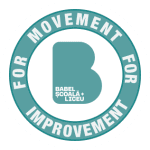Our arriving in Belgium and the first day here
Our trip to Belgium started on Sunday when we took the flight to Charleroi, enlivening our time at the airport with jokes, funny videos and the like. We kept the good will by our side even after we landed, and on the way by bus and then train.
We arrived in Leuven, our first destination, in the evening and were immediately greeted by the city’s incredible architecture, but also by small elements directly related to our research topics.
For example, right in front of the hotel where we are staying, there is a monument erected to remember those people who, not long ago, took their lives. We respectfully read their names, but at the same time we were happy to see such a place that tries to draw attention to mental issues.
Of course, we were all too excited to immediately head to our rooms, so we set off on a short exploration of the city. Even after our past experiences, we marveled at the sight of the bicycle infrastructure. The sidewalks are very wide and yet cyclists are not required to ride on them. At the edge of the road, wide tracks for cyclists are drawn, corresponding to the direction in which the cars are moving.
After a hearty dinner, we ended the day with a slightly different community circle. We had an online meeting, each participating from their room, because half of us were already under the covers, in pajamas. The last sounds of the night were our laughter and the instructions for the next day.
Our first “official” day in Belgium started early with breakfast and a walk to the parking lot where we rented 21 bikes. These, along with two of its students, would take us to our first destination, the De Met School in Leuven.
We drove through the city taking advantage of its infrastructure, which includes: well-defined and continuous tracks (with no poles in the middle of them), roads without potholes in them, and signs at the beginning of certain streets that clearly indicate that cars are not allowed to overtake cyclists, but must stay behind them. We encountered absolutely no difficulties riding our bicycles: the drivers are civilized, and we always signaled on the road, just like the rest of the cyclists.
At one point we reached the suburban area and then some fields and a forest, although the track continued there as well. At its foot, a lot of students had gathered, also coming on bicycles, next to which we also parked our own. We were greeted by some students who divided us into several groups, so that we could visit both buildings of their school.
In the first part of the day we stayed with them, participated in some classes, sports classes, presentations and tours of the school. We realized quite quickly that their school is very similar to ours, having as basic principles the responsibility and independence of each student, focusing on helping them achieve what they set out to do. They don’t have a traditional grading system, but students get a lot of feedback from teachers and their peers when they complete a “challenge.” These are projects that each student has to do and based on which the teacher actually tracks their progress throughout the year. Also, they have a coach, meetings between them and the parents and community circles, although in their case all this takes place more often than at our school.
However, the most interesting and interactive part of the day was when we had the opportunity to speak to De Met students one-on-one and learn more about the subjects we are researching, especially student wellbeing. They explained to us that in Belgium this topic is increasingly popular and that there are organizations that offer free professional advice. It can also be conducted anonymously and without parental consent if the student so desires, which adds to that sense of safety that people usually look for in such situations. Moreover, when we asked them about another research topic, infrastructure for young people, they seemed extremely enthusiastic, and this is because they are very satisfied with what they have. They told us about fairs, beautifully landscaped parks (which we also saw), various shops and even places where activities designed specifically for young people are carried out, such as art workshops and the like.
Next, it was our turn to tell them about the Babel school, our city and the traditional education system from our country. Several of our colleagues, who prepared a presentation on these topics, spoke and answered the questions that arose. It was fascinating for all of us to see this comparison between places so far apart.
Our last activity at De Met for the day took place in their community circles, which students take part in every day before going home. Here we saw that they didn’t only discuss that day, but also relevant things, such as the elections, in the context in which the Belgians also went to vote yesterday, on June 9. The students, some of whom also voted at the age of 16, discussed what the extreme left and right mean, but also about their popularity in the world.
In the end, we got back on the bikes, which then, once we got to the accommodation, we parked in one of Leuven’s huge underground bike parks. For the rest of the day, we had free time and ended with the community circle.
At that time, we each answered several questions and had an open dialogue about what we liked, what we didn’t like, maybe describe a moment that particularly touched us or even think about what we could try to implement at home. Various opinions and ideas were brought up, and in the end we found that from the first day we managed to accumulate a lot of information.
